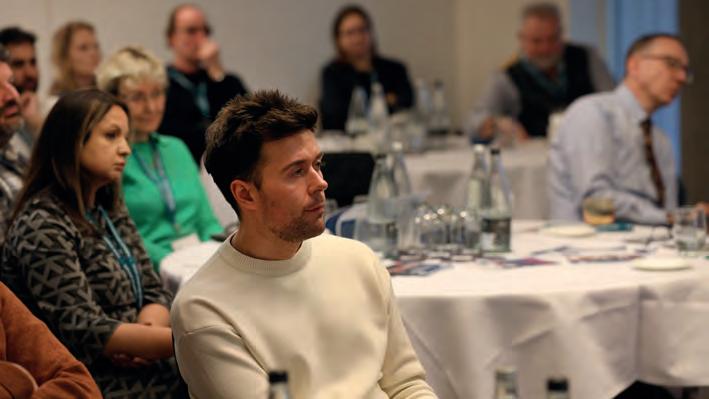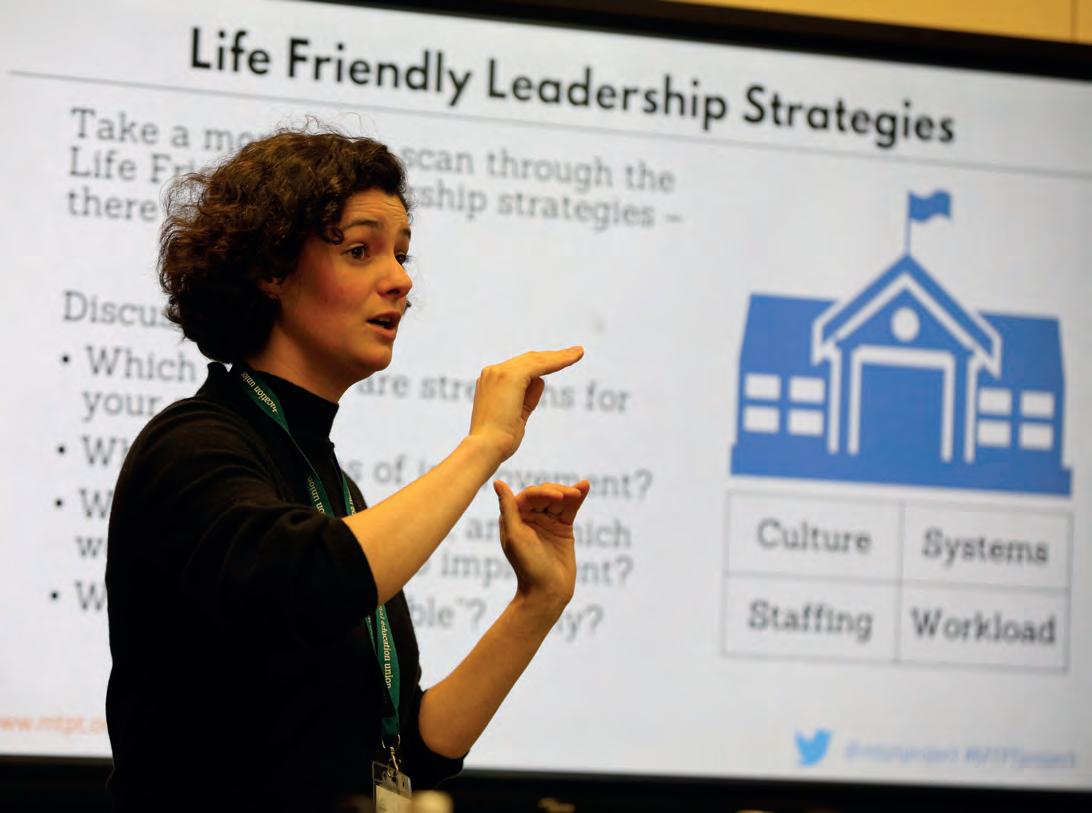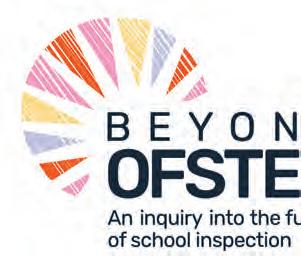New pay offer Union advises members to reject. See page 4.



Staying in touch CPD on maternity or paternity leave. See page 16.

Beyond Ofsted Reforming inspection. See page 19.
magazine
Spring 2023
Strong support Members on strike as parents back our teachers
The
for NEU Leadership members

Lead.
Spring 2023
Chris Dutton on a picket line in the south west of England.
Photo: Lee Thomas
NEU president:
Louise Atkinson
NEU joint general secretaries: Mary Bousted & Kevin Courtney
Editor: Sally Gillen

Editorial assistant: Sarah Thompson
neu.org.uk
facebook.com/ nationaleducationunion
twitter.com/NEUnion
Published on behalf of NEU by James Pembroke Media, 90 Walcot Street, Bath BA1 5BG jamespembrokemedia.co.uk
Senior editor:
Lizzie Hufton
t: 01225 337777
e: lizzie.hufton@james pembrokemedia.co.uk
Design manager: Christina Richmond
To advertise contact: t: 020 7880 7614
e: lead-magazine@redactive. co.uk
Ad artwork coordinator: Rachel Young rachel.young@redactive.co.uk
Except where the NEU has formally negotiated agreements with companies as part of its services to members, inclusion of an advertisement in Lead does not imply any form of recommendation. While every e ort is made to ensure the reliability of advertisers, the NEU cannot accept any liability for the quality of goods or services o ered. Lead is printed by Walstead.
SEEING education leaders stand united with their staff during the industrial action of the past two months has been one of the proudest moments of my time as joint general secretary of our union (see page 4).
It takes courage to say enough is enough, and even more as a leader, but you have been there on picket lines, marches and rallies. You have made our message more powerful.
It was your action that brought Education Secretary Gillian Keegan to the negotiating table. Along with the NAHT, ASCL and NASUWT, Kevin and I took part in days of intensive talks on pay with the Education Secretary last month. Sadly, Keegan once again squandered an opportunity to end the pay dispute. Her offer of 4.3 per cent for most teachers in 2023/24 is insulting (page 4). Worse still, it is not fully funded. In up to 58 per cent of schools, this could force leaders into making yet more cuts to fund rises for their staff.
We cannot accept it. We must fight on.
As Kevin reminded leaders at the NEU Leadership convention (page 8), this dispute is not only about teacher pay.
It is also about education funding.
At the convention, Shadow Schools Minister Stephen Morgan warned that there are now so many crumbling schools it is “a matter of days or weeks until there is a serious incident, which will be a wake-up call for this Government”.
How many parents know this? Too few, I would guess.
Let’s tell parents the brutal truth: Government underfunding is destroying their child’s one shot at a decent education.
Together, educators and parents have the power to deliver that wake-up call to Government.
Mary Bousted
Joint general secretary National Education Union
Features
8 Feature
A recap of the NEU Leadership convention

14 Interview
Head teacher turned researcher Kenny Frederick

Regulars
4 Update
Refuse pay deal, urges union; Ofsted petition; and strikes


22 Final word
Our dispute with the Government is about much more than pay, says Kevin Courtney
16 How I…
Completing CPD during maternity leave
19 Campaigns
Beyond Ofsted, an inquiry into the future of school inspection
20
Interview
Dutton,
of the National Leadership Council, on his role
Chris
chair
Welcome Contents lead. The magazine for NEU Leadership members 3 4
16
8
Update
Union urges teachers to reject ‘insulting’ new pay offer
AS Lead went to press, the NEU began consulting members in England on a new pay offer of 4.3 per cent in 2023/24 for most teachers. The union is recommending members say no.
The offer, which also includes a £1,000 one-off, pro-rata payment for 2022/23, is not fully funded and is less than teachers in Wales and Scotland have been awarded.
It was made by the Government following days of intensive talks between the unions and Education Secretary Gillian Keegan.
These negotiations were prompted by the NEU’s national and regional strikes across England and Wales in February and March.
Analysis by the NEU shows that despite Government claims that the rises would be fully funded, up to 58 per cent of schools would need to make cuts to be able to pay staff the increases.
NEU joint general secretaries Mary Bousted and Kevin Courtney said: “This is an insulting offer from a Government that simply does not value teachers. This offer is less than teachers in Scotland and

Wales have been offered. It does nothing to address the long-term decline in teacher pay and therefore does nothing to solve the problems in teacher recruitment and retention.”
They added: “It is now crystal clear that we have an Education Secretary and a Government that is ignoring the crisis in our schools and colleges. By refusing to address the legitimate and reasonable request to bring to an end more than a decade of belowinflation, unfunded teacher pay increases, the Government is driving teaching and recruitment retention in schools in England to breaking point.”
The ballot ran from 27 March to 2 April. The results were due to be announced on 3 April at the union’s annual conference in Harrogate.
In Wales, teachers voted by 73 per cent to accept a deal and end the dispute. They will receive an additional payment for this academic year (2022/23), made up of a 1.5 per cent consolidated award and a further 1.5 per cent unconsolidated lump sum. The offer also included an increased pay rise of five per cent paid from September 2023.

Defiant Ofsted ignores calls to halt inspections
OFSTED is continuing its inspections, despite calls by unions and head teachers for them to be halted following the death of primary head Ruth Perry.
NEU joint general secretary Mary Bousted, along with other union leaders, had called for inspections to be paused and for the inspectorate to reflect on the “unmanageable and counterproductive stress they cause for school leaders”.
In an open letter to Ofsted published on 20 March, the Suffolk Primary Headteachers’ Association asked: “Are you a force for good or a coercive and dangerous force, a Damoclean sword hanging over dedicated professionals for months and years on end?”
They called for inspections to be halted and for one-word judgements to be dropped immediately.
Schools minister Jeremy Miles confirmed the rises will be fully funded by the Welsh Government.
See strikes coverage, pages 6 and 7
Report from thinktank calls for long-term pay strategy
A REPORT by the National Foundation for Educational Research (NFER) is calling for a longterm strategy on teacher pay, amid a deepening workforce crisis.
Analysis of workforce data by the NFER in its Teacher Labour Market in England Annual Report 2023 showed teacher vacancies were 93 per cent higher in the academic year up to February 2023 than at the same point before the pandemic.
The NFER also warns that recruitment to initial teacher
training in 2023/24 is likely to be “significantly below target”.
NFER school workforce lead and co-author of the report Jack Worth said: “The 2023 teacher pay award should exceed 4.1 per cent – the latest forecast of the rise in average UK earnings next year – to narrow the gap between teacher pay and the wider labour market, and improve recruitment and retention. This should be accompanied by a long-term plan to improve the competitiveness of teacher pay while – crucially – ensuring schools
have the funds to pay for it.”
Responding to the findings, NEU deputy general secretary Niamh Sweeney said: “In its evidence to the School Teachers’ Review Body, the NEU has pointed out time and again the problem that has been stoking. Teachers’ earnings have fallen 11 percentage points more than similar graduates over an 11-year period. This does not help to make teaching an attractive choice and, once in the profession, persistently high workload demands drive out too many too early.”
The magazine for NEU Leadership members 4
lead.
Hand-in of Ofsted petition
JOINED by a group of members, NEU deputy general secretary Niamh Sweeney (pictured right) delivered the NEU’s 50,000-signature petition calling for Ofsted to be abolished.
The petition, part of the union’s campaign Replace Ofsted – let teachers teach, calls for an accountability system that is supportive, effective and fair, and which commands the trust and confidence of education staff, as well as parents and voters.

Niamh was joined at the hand-in at the Department for Education on 23 March by a group of members who are among the tens of thousands of signatories.
Niamh told Lead: “We hear from school leaders every day who are concerned about the grades their schools have been given and their biggest concern is that the inspection teams turning up have no understanding of the wider school community, the impact of child poverty, deprivation, the impact of austerity and the support services around the school.
“We also hear from school leaders about a culture of demanding information and dismissing school leaders when they are trying to explain the individual experiences of the children in the school. It’s really difficult to understand from a twoday visit the impact that education is having on children, particularly in areas where there is high deprivation or high unemployment. The Tripadvisor-style rating of a school is hugely damaging and doesn’t reflect what is happening in that school community.”
She added that the appeals process for challenging Ofsted judgements was complex and lacked transparency.
“We want accountability to be able to build school
Academy trusts plan scrapped
improvement, to be able to support leaders and to provide the best education for children and young people. But what this system does is label schools and communities, which makes it really difficult for schools to improve out of that,” said Niamh.
Executive member and London secondary teacher Ed Harlow (pictured above, centre) said: “As an NEU case worker, I deal with a lot of people who are facing very stressful situations in their school. There is a really high level of accountability, and I see first-hand the difficulties that schools face in the run-up to an Ofsted inspection.
“We hear a lot from heads who say they can’t predict with any consistency what judgement they may get because it depends on the Ofsted team. Heads tell us quite often that inspectors seem to have made up their minds before they even get near a school.
“The stakes are so high, particularly for school leaders in terms of making or breaking their career. If you take a school from Outstanding to Requires Improvement, that can be careerending for the head. That stress then feeds through the system, all the way down from the head to the teachers and support staff.”
See page 19
PLANS to force all schools into academies by 2030 have been dropped, NEU joint general secretary Kevin Courtney told leaders at the NEU Leadership convention. “We have derailed the Schools Bill and the 2030 target has been dropped by the Government. We defeated Nicky Morgan when she tried to do this in 2016 and we have defeated it again.” He added that some schools may still come under pressure to make the change. “But there is space to resist being dragged into academy trusts, and we have won challenges in a variety of places,” he added. See coverage of the convention on pages 8-11.
Have your say
WHAT is it like to be a school leader in the current climate? If you are interested in sharing your views, please get in touch with the union. We are working with the University of Manchester to find out more about your experiences. Professor Ruth Lupton, who has surveyed thousands of members, is looking for people willing to be interviewed in-depth for the research. To get involved, please email sally. thomas@neu.org.uk. An analysis of the research findings will be published in the next issue of Lead.
Join the council
ELECTED regionally, the National Leadership Council develops networks which feed into national discussions, helping to shape and develop policy. It is just one route for making sure the voice of NEU Leadership members is heard across the union. If this appeals to you, please contact Steve, the national official for leadership at steve.cooper@neu.org.uk
See Q&A with the chair of the National Leadership Council Chris Dutton page 20.
lead. The magazine for NEU Leadership members 5 Update
Niamh Sweeney (right) handed in the petition
Photo: Rehan Jamil
Leaders join strikes for fair pay
STANDING shoulder to shoulder with their educator colleagues, NEU Leadership members in England and Wales have been taking industrial action as part of the ongoing pay dispute with the Government.
Strikes began in England and Wales on 1 February, the first national action by the union for 12 years, involving around 300,000 members. Thousands of schools closed or partially closed.
The Government’s refusal to give teachers and support staff a fully funded, above-inflation pay rise, despite the union’s repeated warnings that poor pay is fuelling a national teacher shortage, has forced industrial action.
Education Secretary Gillian Keegan met with the union after 1 February but failed to offer a better deal than the five per cent given to most teachers for 2022/23.
This forced further strikes across different English regions on 28 February and 1, 2, 15 and 16 March, and in Wales on 2 March. Following meaningful negotiations between the NEU and the Welsh Government, a new and fully funded pay offer was put to teacher members, who accepted it. As a result, the strike days scheduled in Wales (15 and 16 March) were called off.
Teachers were offered an extra 1.5 per cent consolidated and a 1.5 per cent unconsolidated. There was no improved
offer for support staff, who have also been striking in Wales.
Support for the action among parents and the public has been high, and members on picket lines have been cheered and applauded. An Ipsos poll shows 60 per cent of parents are behind our strike, while 48 per cent of Britons support teachers and the fight for improved funding for education.

Individual head teachers at other unions such as the NAHT, which did not reach the threshold for industrial action in its ballot, donated their day’s pay to hardship funds in a gesture of solidarity. Two more national strike days were held in England on 15 and 16 March.
Government ignores warnings that poor pay is fuelling national teacher shortage
THE union wrote 18 letters to four education secretaries, and met ministers seven times between June 2022 and January this year, warning that poor pay is contributing to a recruitment and retention crisis in education that is growing worse by the day.
NEU joint general secretaries Mary Bousted and Kevin Courtney told the Government that unless it
awards a fully funded, above-inflation pay rise, more educators will quit.
Teachers are leaving their jobs in droves, as are support staff, forced out by a toxic mix of excessive workload and poor pay. As Lead went to press, Education Secretary Gillian Keegan had made a new offer, following intensive talks. The union opened a ballot (see page 4), advising members to reject the “insulting” offer.
lead. The magazine for NEU Leadership members 6 Update
Thousands of NEU Leadership members have shown solidarity with their colleagues across education, taking part in industrial action in February and March.
Clapping doesn’t pay the bills
A GROUP of heads and deputies marched through the streets of Lancaster on 1 February to demonstrate against the Government’s proposed anti-strike laws.
Rallies and marches were held across the country, after early morning pickets at thousands of schools and colleges.
Siobhan Collingwood, a former primary head teacher and member of NEU Leadership, was among the group and addressed the crowd. “Teachers don’t want to be on strike today and this could have been avoided, but is a reflection of long-term systemic underfunding of our schools, from a Government that doesn’t value our schools or the education of our children,” she said. “Teachers are striking because we care about the children in our schools, because we know that if parents knew of the conditions in our schools they would be horrified. If parents knew, they would be on the streets demanding better for their children.

“The only reason they don’t know is because of the relentless professionalism of teachers and school leaders who carry on regardless, desperately trying to make this broken system work for the good of the children in their schools. But no longer. It is time to stand with our colleagues from other public services and say ‘Enough!’ It’s time to value our key workers – platitudes and clapping don’t pay the bills, or make our jobs rewarding, sustainable, possible.”
Catherine Armistead, head teacher of Skerton St Luke’s CE School in Lancaster, told Lead: “It was good for
staff to see leaders take action, and we also had a really good reaction from the public. I felt it was important to strike for everybody in education, and because of the wider cost-of-living crisis.
“As a leader I’m concerned about losing staff who are looking for jobs that pay more. Some of our non-teaching staff are going to work in supermarkets, for example. Even here, where the cost of living is a little bit less than, say, London, staff are struggling with mortgages and payments and the general cost of living.
“I get food boxes donated to school containing long-life food, and I have staff who ask to take a box home because they are really struggling with the cost of living.”
Catherine added that more and more was being asked of schools and staff, including supporting increasing numbers of children with special educational needs, at a time when wider support was being cut and there was a two-year waiting list for ADHD and autism assessments. “We are now not just trying to teach the curriculum, we are going above and beyond every single minute of the day. It is exhausting. It’s demoralising,” she said. “Staff should be earning a decent amount of money that they can live on, but also schools should be funded better. This industrial action is about pay but it’s also about making sure schools have the appropriate amount of funding in order to meet the needs of the children they have.”
NEU joint general secretary addresses members in Cardiff
MEMBERS on strike in Wales on 2 March were joined by NEU joint general secretary (JGS) Mary Bousted, who, along with fellow JGS Kevin Courtney, has been joining picket lines, marches and rallies during strike days.



lead. The magazine for NEU Leadership members 7 Update
DEPUTY head Chris Dutton on the picket line with colleagues in the south west of England.
Photos: Lee Thomas and Matt Wilkinson
NEU Leadership convention

NEU joint general secretary Kevin Courtney updated leaders on the ongoing pay dispute, saying it was “absolutely essential” that we continue to press for a fully funded increase.
Speaking at this year’s event in London on 9 March, Kevin acknowledged the pressure Government put on heads to keep schools open during the strike days across England and Wales in February and March.

“We don’t want to be on strike. We want to negotiate and get a settlement, but we want a settlement that starts to change things for education and get us back in the right direction,” he said.
He added that it had been “truly astonishing” to get a ballot result for industrial action, which Education Secretary Gillian Keegan and other important gures, including the chair of the School Teachers’ Review Body, had not expected.

It was widely believed that the union would not meet the high thresholds, he said, and without that result the Government would not make any improvements to the average ve per cent o er.
He went on to say, however, that it was important that the campaign for better pay and education funding went beyond strike action, and that galvanising parents would be key to in uencing the Government.
“We have an enormous audience who are the parents, who listen to us, who trust teachers far more than ministers,” said Kevin.
He pointed to a poll by Ipsos showing 60 per cent of parents actively support the strikes and another 20 per cent are neutral about the strikes but support the demands for investment in children’s education.
Only 20 per cent oppose the strikes. “ at’s worrying for a government. ey know we are mobilising parents when we strike,” said Kevin. “As a leader you will not only want
to be part of your union and its industrial action but you will also want to be part of the intellectual case around these questions.
“ ere is so much workload attached to recruiting new sta , mentoring new sta , and the stress you feel when you can’t put the right teacher in front of the right class. But not just that. It’s the way the Government is trying to pressurise you during the strikes.
“ e Government is telling you to keep schools open under all circumstances. at creates a tension for you. It’s not just about pay and prices this year. It’s also about having a Government that makes a commitment to a long-term correction in teacher pay.”
See nal word page 22
lead. The magazine for NEU Leadership members 8
NEU leaders gathered for this year’s leadership convention, where they heard from a wide range of speakers and enjoyed a day of CPD and networking.
NEU Leadership convention
NEU joint general secretary Kevin Courtney spoke to leaders about the support they have from parents
Photos: Rehan Jamil
93% of delegates said the event was good or superb
Crumbling schools: we are just days from a ‘serious incident’
THE recruitment and retention crisis and crumbling school buildings are the two issues keeping the Shadow Schools Minister awake at night, he told leaders.
Stephen Morgan said the Government was not taking the staff shortages “anywhere near as seriously as it should be,” adding: “More teachers are leaving our classrooms than entering. We have a recruitment and retention crisis created by this Government.”
In a short but wide-ranging address, Morgan also raised as a serious concern the “terrible state” of many thousands of schools.
One in six children was being put at risk, he said, adding there hasn’t been a review of the conditions of school estates since 2019.
He warned: “It’s a matter of days or weeks until something drastic is going to happen. There is going to be a serious incident and it’ll be a wake-up call for this Government.”
Secondary head and former NEU president Robin Bevan told Morgan: “My biggest concern is capital investment. If you gave me £1 million tomorrow, I’d spend it within a week repairing the infrastructure of the school. We need tarmac relaid on playgrounds. We need the 1930s downpipes and guttering redone.
“I would like to propose a policy for Labour’s manifesto, which is that every school is guaranteed to be refurbished every 25 years and rebuilt every 75. The Government announced last autumn that it was rebuilding 500 schools in the next ten years – at that rate, every school building in this country has to last 488 years.”
In an impassioned plea that drew applause from delegates, London primary head John Hayes urged Morgan, who outlined a number of proposed new initiatives that would be introduced if a Labour government comes to power, to simply focus on reinvesting in education.

“We don’t want new initiatives. We just want the money to do the job, but we don’t have it. We don’t want to be sent on any more courses to run new, clever initiatives. We just want Ofsted reformed so it’s not a threat.
“You are our hope. Please give us the money we need because we know how to do this job. You have to trust us – we are the professionals. We don’t want gimmicks. We just want the money to do the job and get the kids what they need.”
Morgan acknowledged that the £2 billion announced by the Government, available from 2025, would only get funding back to 2010 levels. He said a Labour government would raise money from axing nom dom tax status and tax breaks for private schools.
He went on to say that the post-16 sector has been undervalued and not resourced for quite some time. “FE is at crisis point and I know Keir is committed to investing in skills.”
The Labour Party wanted to work with the education sector to devise policy proposals so they were evidence-based, he said.
Learning from school leadership
FORMER head teacher Kenny
Frederick shared her experiences of headship, which she described as a “fabulous job”. She also outlined lessons from her time as a PhD researcher, and insights gleaned from her role as a volunteer at Headrest, a national helpline for school leaders.
Kenny told leaders that on top of their unmanageable workload, many teachers feel they are constantly monitored.
Her research had taught her that many teachers are anxious about having their lessons observed, she added, but they also tend not to trust the judgements of the head because they haven’t seen them teach.
In turn, teachers switch off when they are being given feedback and simply wait for the last line or two summing up their performance.
“A lot of teachers are too afraid to try something different in the classroom because they fear they will be judged. In many schools teachers have no say in what is taught,” she said.
Kenny went on to talk about Headrest. “We’ve had awful calls where people have been shown the door because they have had a bad Ofsted,” she said. “Heads are treated really badly, sometimes by governors, which upsets me because I’m a governor. When I’m talking to governors, I say ‘Ask the head questions but stop trying to undermine them.’”
Urging members to read Headrest’s annual report, which was published in February, Kenny said: “You’ll realise you’re not alone.”
See interview, page 14, and go to headrestuk.co.uk/blog/ headteacher-wellbeing-report-2023

lead. The magazine for NEU Leadership members 9 NEU Leadership convention
Stephen Morgan MP promised investment
“We don’t want gimmicks. We just want the money to do the job and get the kids what they need.”
– Primary head John Hayes
How to develop a trauma-informed setting
A TRAINER and former head teacher who helps schools to develop trauma-informed approaches gave a fascinating talk on the links between trauma, neurobiology and behaviour.


Siobhan Collingwood, who led a primary school in a deprived area of Lancashire for many years, said she wished she had known about trauma when she had started teaching.
“Too many of our schools and staff are not asking what baggage young people are bringing into the classroom with them,” she said, adding that trauma caused by adverse childhood experiences including parental abuse, violence and substance misuse, and its impact on children was often not recognised.
“All school values focus on pupils being the best version of themselves, having respect and self-esteem. They don’t consider things like creating safety and
having your biological needs met in order to be able to achieve those things,” said Siobhan, who trains teachers, police officers, social workers and probation officers in understanding the impact of trauma.
She also spoke about the early care of babies and the effect on children of poor attachment to a parent or caregiver. “Until the age of three, the brain grows in response to the interactions it receives. For the 40 per cent of people who do not have a secure attachment, it will impact their brain to the extent that I would consider a child who has very poor attachment before the age of three as being equally neurodivergent as someone with autism spectrum disorder.”
Children whose behaviour has been
affected by trauma often think of themselves as mad or bad. “Let’s tell them that they’re not. That they are a bit sad and that’s what is leading them to behave the way they are. It’s not a choice. It’s a physiological response and they aren’t in control of it,” she said.
Trauma-experienced people are affected cognitively in a number of ways that can include being hypervigilant to perceived threat, and experiencing problems with memory. They may also have issues with personal boundaries.
Schools which have undertaken the trauma-informed schools programme in Lancashire focus on communication, specifically the importance of language. They learn that a child who is misbehaving is not “trying to push your buttons”, explained Siobhan.
Instead of saying to a child “why haven’t you done any work today?” say “I noticed you had a problem getting started today”, she advised.
“Notice statements are better because they aren’t aggressive or confrontational. In workshops with schools, we work on microscripts that will work with specific children.”
Siobhan told leaders that they need to provide time for reflective practice, so teachers have opportunities to consider how they work with challenging behaviour.
A series of videos for schools on working with deregulated children by Dr Bruce Perry was recommended by Siobhan. thinkkids.org/tothehelpers
lead. The magazine for NEU Leadership members 10
NEU Leadership convention
“Too many staff are not asking what baggage young people are bringing into the classroom.”
Siobhan’s talk included practical tips for speaking to children at school
Siobhan Collingwood gave a fascinating talk about working in a trauma-informed way
Inspiring leaders share
their experiences
Head teachers talk about the challenges and the joys of running their school, including through the pandemic
Bola Soneye-Thomas
BOLA Soneye-Thomas closed her primary school, where she has been head for 16 years, on 20 March 2020. On 1 April, her sister died from Covid-19. Bola kept her bereavement from staff, knowing they were already afraid, and continued to lead her school. She spoke about her pride in her staff during the pandemic and reflected on its continuing impact.
DURING Covid, staff came together and gave it their all. My school is a school of two halves. Half are well-to-do, the other half aren’t. The ones who are well-to-do are the loudest, and it is very easy to pander to the loudest voices.

During Covid we decided we weren’t going to do Google Classroom. We were going to have working groups. The parents wanted us to log on in the morning and stay with the children all day, but we felt we were educators, not babysitters, so we wanted to do group sessions instead. Classes were split into groups. If the child didn’t turn up, we would phone straight away to ask where they were. Out of that we did have safeguarding concerns that we were able to raise. The louder parents then set up a petition because they didn’t agree with how we were teaching remotely, and they verbally attacked teachers.
It was tricky and challenging, but we knew that was the right thing to do, so we stuck at it, and we saw the benefits when the children came back to school. And –although it’s not about SATs – we got good results as well.
The challenge that has come up from Covid is recognising that people have lots going on in their lives and appreciating and understanding that.
We locked down on 20 March and my sister died from Covid on 1 April. I then had to carry that and continue as a school leader. I didn’t think it was right to
share it with the staff. I could see they were all panicking, so to burden them would have just been too much. It made me hypervigilant and really scared because I was worried about my teachers. Once I had someone close to me die, I was worried about putting teachers on the frontline.
Now Covid is over-ish, I feel like we all kind of have post-traumatic stress disorder. It has affected the children in terms of their social skills and stamina. We see it in parents’ high levels of anxiety, with them constantly bombarding us with things they are worried about. We see it in terms of long Covid affecting children and staff. I see it in staff thinking ‘why am I doing this? I turn on the TV and it’s just criticism of teachers.’ They feel their friends are able to go and have a night out, the job isn’t consuming their lives, and they are being paid more and they have more respect.
But I know if I had my time again, I would still do this. It’s the best job ever. It is essential that those teachers coming behind me see that and understand that, yes, it has its ups and downs, but it is absolutely the best job in the world. I feel I have a responsibility to develop them, so that is part of the challenge: continuing to keep them going so they don’t just see the negatives.
Bethan Jones
Bethan Jones is head of a small, rural school in Wales.
IN the last week before the Christmas holidays, I was the caretaker, the cleaner and the secretary. I filled in the rabbit holes in the school field. That’s the reality of the situation.
We have some real positives in Wales. We are in the middle of a transformational curriculum that talks about purpose-driven education, which is amazing. It’s difficult being in the middle of a transformational curriculum when you have a recruitment problem, when you have so many issues in terms of staffing, and when you end up cleaning the toilets after school, but it is also an exciting time. There is the Additional Learning Needs (ALN) Bill, and all of the challenges that are in England, we have too. The system in Wales is different. We have local authorities that are very depleted. They are very understaffed so they delegate by sending all of the paperwork to heads, who have to absorb it and are accountable for the delivery and any issues that arise.
Bola
The language of my daily work is Welsh, and the aim is to have one million Welsh-speaking children by 2050 out of a population of three million. Children come in at seven and they have no Welsh, but by the time they are 11, they are bilingual. It is a privilege to be a part of that and to see that transformational change. We have that, the new curriculum and the ALN Bill, but we also have recruitment problems. It’s a nightmare. So on top of everything else, I’m a teaching assistant, I teach all subjects, and I know there are huge issues with recruitment, but being a leader is still a privilege. As leaders, we need to present what’s best for our children. We must go forward as ethical leaders to keep our staff on board and serve our communities. If we do that, we can be instruments of change.
lead. The magazine for NEU Leadership members 11 NEU Leadership convention
Soneye-Thomas (left) and Bethan Jones


Time to talk
Former head Kenny Frederick tells Sally Gillen it’s critical for leaders to have a safe space to discuss the pressures of the job.
Photos: Rehan Jamil
KENNY Frederick retired from headship in 2013, after 17 years as leader of a secondary school on the Isle of Dogs in London. Her departure was prompted not by burnout or disillusionment, but simply by a realisation that it was time to move on and “let someone else have a go,” she says. Now an education consultant, she has learned as much about schools and leadership as an outsider going into schools as she did during 40 years working in them.
Her decade of new learning began after retiring, when Kenny embarked on a PhD that took her into classrooms as a researcher. She watched, she listened. Teachers spoke to her frankly about their experiences, their professional hopes and fears, and it taught her a lot.
“We tend to think imposter syndrome only affects leaders, but I found there are a lot of teachers who are worried that they will shortly be ‘found out’,” she says. “Also, many teachers find it hard to be honest with the head, or other members of the senior leadership team, about things in the school, which I didn’t realise when I was a head teacher. To make staff feel included, leaders need to make it clear to teachers that they have trust in them, in their judgement and opinions. That they matter.”
Without that, all sorts of problems can arise. Her own experience of a bullying head was a brutal, but valuable, lesson in how not to lead, and it was the need to escape this situation that prompted Kenny to apply for a headship. It’s a move she might otherwise never have considered.
She remembers a policy that any staff member calling in sick would have
to speak directly to the head. “Believe me, that was not a good experience,” she recalls, hinting at the grilling involved.
Autocrats have no place in schools. “Leading is about collaboration,” she stresses. “A lot of the head teacher training, such as the NPQH, presents headship as a formula, but it isn’t like that. You must bring your own personality to the job, and trusting teachers – I’ll say it again – is important. They should feel able to disagree with the leader. As a head, I certainly wasn’t the best teacher in the school, and I also knew that the teachers were the experts in their subject. That’s why it makes sense for teachers to be observed by other teachers rather than senior leaders.”
That also takes the pressure out of being observed, which can only be a good thing for staff wellbeing. It will do more to boost staff inclusion and wellbeing than yoga lessons at lunchtime, she laughs.
Treating staff well is not simply the right thing to do, but it makes sense amid the deepening recruitment and retention crisis. Not that it is exclusively teachers
who are quitting. Increasing numbers of leaders are opting for early retirement, driven out by remorseless pressures.
Again and again, Kenny is shocked by the stories she hears as a volunteer for Headrest, a national helpline launched for head teachers in October 2020. She describes it as Samaritans for head teachers.

“I am hearing some appalling tales,” she says. Ofsted, unsurprisingly, is cited by many as a source of significant stress, and while a decade has passed, Kenny remembers the pressures well from her days as a leader. So stressful was an imminent inspection that she would have hypnosis in the lead-up to help her cope.
“Ofsted is causing a lot of problems,” she sighs. “We are hearing of heads being put on gardening leave and then managed out if the Ofsted inspection isn’t good. We are hearing of heads collapsing because of the stress.
“Heads of small schools, where there is one-form entry, are under intense pressure. They don’t have a team around them, which means they are responsible for everything. I know of one small school where the head is also the caretaker because there is no school keeper, and they also run the wraparound care because there is nobody to do that either. It really is too much.”
As a head it is vital to have a team, and someone in school to confide in, she adds. “It certainly doesn’t have to be a member of the senior leadership team, but make sure you have someone.”
Find out more at headrest.co.uk. Get in touch at hello@headrest.co.uk, 0800 862 0110 between Monday and Thursday 7pm-8pm or at a pre-arranged time to suit.
lead. The magazine for NEU Leadership members 14 Interview

‘In wanting to protect women, we sometimes limit them’
SINCE starting a charity to help teachers who want to continue their professional development while on parental leave, former secondary school teacher Emma Sheppard has been met with everything from criticism to incredulity.
“In the early days, there was someone on social media saying ‘this must be a satire’,” laughs Emma, founder of the Maternity Teacher Paternity Teacher (MTPT) Project. The organisation provides networking, training and coaching programmes with qualified coaches, many of them former teachers.

“It was as if the mere suggestion that you can do anything else other than care for your baby during maternity leave was a joke.”
In reality, some new parents – mostly mothers – need the option to combine parenting with professional learning and development, she adds, and the two things should not cancel each other out.
A difficult transition
“When some people first hear about the MTPT, the criticism is ‘just relax, and have this precious time with your baby.’ But, actually, the way individuals ‘do’ their life is their choice, and there is a real danger that in wanting to protect women, we can sometimes limit them and their
choices, or shame them for their choices. We know that many people find the huge transition in their identity very scary, so holding on to something familiar is very reassuring and positive for mental health.
“Many teachers who go on leave, particularly women, feel so strongly that it is an either/or: do I have these precious
moments with my baby or do I hold on to my teacher identity? But there is a way of saying I love my job, I love my baby, and let’s enjoy those things together.”
That was how Emma felt back in 2016, when she went on maternity leave with her first child. She had worked until she was 39 weeks pregnant, frantically busy in the summer term leading up to GCSEs, but then found the comedown from such an intense period destabilising.
“I went from being very important in a high-challenge school, and very busy, to being very bored and not having any structure to my day,” she says.
Her son was late, so Emma began blogging about some CPD she was doing through FutureLearn. When he arrived, Emma continued blogging and sharing the bits of CPD she was doing, such as visiting art galleries, although at that stage she didn’t even think about it as continuing her professional development.
“I just wanted to keep my brain going,” she says. “As busy as new parenthood is – and it absolutely is – it is a different kind of busy from what we might be used to as thinking, educated, busy professionals. For many people, daytime telly and boxsets are their bag, but they weren’t mine. It was so positive to be doing things the way I wanted to and feeling liberated to do that.”
16 How I…
lead. The magazine for NEU Leadership members
Teacher Emma Sheppard’s charity helps teachers who want to combine CPD with parental leave. Sally Gillen finds out more.
Emma Sheppard was met with incredulity when she suggested CPD during maternity leave
Spreading the word Emma created the MTPT Project Twitter handle and tweeted about the CPD she was doing, and, over time, began speaking to other women about the potential to combine parental leave with professional development.

“So many women connected via social media, email or at conferences I attended with my son, sharing their experiences. Over time, we built a website of case studies celebrating these choices to provide role models for others who needed to see others parenting and teaching in a way that felt right to them.
“But these things didn’t happen overnight. Trial and error, learning new skills around technology, marketing and leadership and a lot of courage to speak up against the status quo was required.”
And Emma didn’t always have a receptive audience.
At a WomenEd conference in Sheffield in 2016, she stood ready to welcome delegates to her session. Nobody came. “That was hard,” she says, cringing at the memory. “I was trying to be fine about it, but I was a bit teary – and very tired – and I explained to Hannah Wilson, one of the organisers, that nobody was interested. Hannah said: ‘That’s because what you’re doing is groundbreaking. Nobody understands that this is a problem. You’re the only person pointing out that motherhood is hugely detrimental to women’s careers and one of the reasons we have such a gender pay gap and inequality in educational leadership is because of motherhood. Everybody is looking the other way because nobody knows what to do about it.’
17 How I…
lead. The magazine for NEU Leadership members
Emma spoke to leaders about the MTPT Project at the convention in London on 9 March. Photos: Rehan Jamil
“As busy as new parenthood is –and it absolutely is – it is a different kind of busy from what we might be used to as thinking, educated, busy professionals.”
“That was when I started to think about the issue more systemically, and it became less about just my wellbeing – and running around museums – and more about the wider picture.”
Empowered by the coaching she had undertaken herself, Emma began coaching others through a pilot programme that aimed to acknowledge and celebrate all the small bits of CPD – listening to Radio 4 podcasts, watching documentaries, visiting places of interest – that people were doing around caring for their baby.
By this point, Emma was back at work full time, with two children under the age of three. “The MTPT Project community just kept growing,” she says. “It was an organic process as the word spread and more and more people felt that we were exactly what they needed – either to connect with during their own leave, or to support with retention and wellbeing of their staff.”
The more time she gave to it, the more the project grew until Emma reduced to 0.8 of her previous full-time hours in school, to dedicate time to both passions.
Changing the system
Ironically, the pandemic and a family relocation to France mean that Emma now coaches and works on the MTPT Project full time, a classic example of the attrition that is so often seen among motherteachers. “It was a hard decision,” she says. “On the one hand, I’m able to dedicate more time to systemic change now, but on the other hand, it highlights the many nuanced details of women’s contribution to the workforce, and factors we need to weigh up when making choices about our careers and our family life. I miss teaching – it was where I felt most myself – but we have the capacity now to make a bigger positive impact on the education system.”
MTPT programmes have developed, and the range expanded. Some employers pay for places. The NEU is the only union to provide funding for members who want to take an MTPT course. As well as facilitating self-directed CPD, there are now five further 1:1 and group coaching programmes available, empowering new parents during their leave, as they return to work, and as they balance career and
BILLED as a lifeline for educators who want to combine their passion for teaching with becoming a parent, and the school leader who wants to empower them, the handbook sets out how teaching can be a sustainable career choice for parents. It contains case studies, and over nine chapters it covers issues including the legalities associated with different stages of working parenthood.
Published by Routledge paperback, £16.99. Go to routledge.com/A-Guideto-Teaching-Parenting-andCreating-Family-FriendlySchools-The/Sheppard/p/ book/9781032043616

Go to mtpt.org.uk and @mtptproject #MTPTproject
family life. The MTPT Project offers training for school leaders, HR and line managers; standalone workshops for returners; and support with flexible working requests.
The return to work is often a pivotal moment for new mothers. Research shows women aged 30-39 are the largest demographic to leave teaching, which is linked to the maternity period. In 2018, during her second maternity leave, Emma
started researching this issue, proving the existence of what she describes as a “motherhood penalty in education”.
Too often flexible working is put forward as the only solution to retaining women with children, she argues, but there are many other things that can make a significant difference. They include making available CPD opportunities, so this huge group of teachers do not feel they are stagnating, and reducing workload.
A ten-week programme, Life Friendly Leadership, covers the issues leaders should be looking at to create the right school culture for teachers with children, and in the context of a deepening recruitment and retention crisis, they should be paying more attention to creating the conditions needed to retain highly valuable mid-career teachers, argues Emma.
A handbook from the MTPT Project, written by nine chapter authors with strong links to the community, and edited by Emma, was published in March. It includes the dos and don’ts of legalities over this period (see box, left).
“The wrong comment taken out of context can be so easily misconstrued as an employer telling someone to work while on parental leave. What we say is that the leader can inform staff about the MTPT Project, as they would any other CPD or training opportunities, and then they can step back, leaving the choice up to the individual,” she says.
lead. The magazine for NEU Leadership members 18
“I miss teaching – it was where I felt most myself – but we have the capacity now to make a bigger positive impact on the education system.”
How I…
Campaigns
Beyond Ofsted
A PANEL of education experts brought together by the NEU is carrying out an inquiry into school inspection, gathering evidence on its strengths and weaknesses so it can make recommendations for an alternative approach.
Beyond Ofsted – an inquiry into the future of school inspection – will run until November.

It has been established in response to growing concerns that Ofsted increases workload, pressure and stress for leaders and teachers, and that its judgements are unreliable. Sackfuls of Unhappy Birthday cards from members were delivered to the inspectorate by NEU joint general secretaries Kevin Courtney and Mary Bousted to mark its 30th year in 2021. e messages within summed up the feelings of most educators –Ofsted must go.
Furthermore, research has shown that the inspectorate’s judgements are not reliable and do not make a positive di erence. A 2018 National Audit O ce report concluded: “Ofsted does not know whether its school inspections are having the intended impact: to raise the standards of education and improve the quality of children’s and young people’s lives.”

Research shows that schools in areas of high deprivation are more likely
to receive a poor inspection grade. In turn, this has many negative e ects on schools, which already have numerous challenges, making it harder to recruit and retain sta .
e NEU believes there is a growing momentum for change, with an inspection system that is supportive, e ective and fair.
e inquiry will be undertaken by an expert advisory board, chaired by Labour peer Lord Jim Knight, which includes head teachers, teachers, education policymakers and academics.

It will answer two questions: What could a better inspection system in England look like? What are the principles that make a good inspection system and how does that translate into
inspection processes and practice?
It will also look at how inspection systems operate in di erent countries that have high-performing education systems, and explore the views of parents and carers, including what they might like to see change.
A survey of practitioners to draw upon the expertise and ideas from those who have experienced inspection rsthand in di erent settings and contexts will be carried out. Focus groups with teachers and school leaders, and another with parents and carers, will also be held. ere will also be expert interviews with education policy and decisionmakers.
e inquiry will publish its report by the end of the year.
lead. The magazine for NEU Leadership members 19
A new inquiry will seek to find a supportive, effective and fair system to replace Ofsted.
There is growing momentum for change, with an inspection system that is supportive, effective and fair.
Labour peer Lord Jim Knight is chairing the inquiry into the future of school inspection
Leading by example
Chris Dutton is a deputy head and chair of the union’s National Leadership Council. Lead spoke to him about his involvement in the union, his time in education, and the recent industrial action.

Q How did you get into teaching?
A I always thought teaching or law could be a career for me. After graduating, I worked in London in tax for an international accountancy firm and quickly realised that I wanted a career that gave something back, used my languages, was more people-focused and had more professional autonomy. I went back to university to complete my PGCE in modern foreign languages in 2003 and took up my first teaching post that September. I have stayed at the same school, a large state secondary in a semi-rural setting, ever since. I started as head of sixth form, I then became head of faculty and had secondments to the senior leadership team focusing on ICT
before securing a permanent assistant headship, leading on key stages three and four, as well as pastoral responsibilities such as deputy designated safeguarding lead. I am now one of two deputies, with responsibility for the curriculum.
Q What do you enjoy about being a senior leader?
ABeing able to support others to achieve in their role. Sometimes, at the end of the day, you think “what did I actually get done today?” but often it’s that you made sure others could do their job. I like that every day is different, the work is very varied, and I’m able to make decisions that impact positively on 1,450 children’s learning.
QWhen did you join the union and why?
AI became involved with ATL, one of the NEU’s legacy unions, in my third year of teaching after I attended a meeting. I’m not sure what made me go –I just remember seeing a leaflet at school and thought, why not? I had been active in NUS politics at university, and after graduating was a sabbatical officer at my university for a year, so I have always had an interest in unions.
QWhen and how did you become active in the union?
AI was a school rep for many years. I stepped down when I had been
an assistant head for a couple of years. It was odd to be making a joint decision on something and then sit the other side of the table a few days later with the other reps having the head explain the decision that I had been part of. I felt members needed someone more neutral they could go to. I remain active on my district’s committee, still attend national conference, and have been district treasurer since 2014.
When the ATL and NUT amalgamated, I put myself forward to be an executive member. Juggling that responsibility and commitment, attending three regional councils due to how my electoral district is structured, and working full-time on top of other commitments can be quite challenging and pressured. But, ultimately, I enjoy the representation side and I guess that ties in with law being a possible career path.
It’s really important to be involved in the union – some members probably think it’s all the officials who are the union without realising they are the union and they have the power to get things done. The NEU –expertly led by Kevin and Mary during the pandemic – has really made its mark on key social justice issues such as child poverty,
20 lead. The magazine for NEU Leadership members Interview
Photos: Rehan Jamil
Chris on the picket line with his colleagues
“Members are the union and have the power to get things done.”
and is leading the way in campaigning for a properly funded education system.
QWhat prompted you to put yourself forward to become chair of the National Leadership Council (NLC) and what does it involve?
AThree executive members are elected to the different councils and organising forum and, as a school leader, I was keen to become involved in the NLC, having been part of the Association of Managers in Education (AMiE) council within ATL, when we launched a code on ethical leadership. I felt being part of the NLC was a great way to move the work I had done previously (in 2020, the NEU launched a revised code of ethical leadership practice). I chair three meetings a year, and the NEU Leadership convention and work closely with the vicechair. I’m also the person who gives the leadership perspective at the executive’s meetings, making sure NEU Leadership members are considered.
Q Why is it important the NEU has an NLC and how would you encourage other leaders to get involved?
AThe NLC’s members come from a wide range of educational settings
and that brings a breadth of experience and perspectives. Each school and college is different, and the more leaders who are involved, the more representative the NLC is of the wider membership. We have opportunities to collaborate and contribute to the formation of NEU policies. The only real commitment is attending three meetings on a Saturday, in person or remotely.
QWe have a lot of members who are new to senior leadership. How could joining the NLC benefit them?
AAny member who is new to SLT will, on the NLC, be exposed to the new ideas and different perspectives of other senior leaders. It’s a way to meet new leaders from different parts of the country who you can turn to for advice or guidance. I have known Robin Bevan, who was NEU president in 2020/21, since we were both on the AMiE council, and I have always been grateful for his wisdom when I have turned to him for advice on how to approach a particular issue.

QYou were out on the picket line in February and March. What are your reflections on the industrial action?
AMembers at my school took action en masse because we all recognise
the need to fund education properly and ensure our profession is attractive to potential new joiners. Pay is part of that.
I construct my school’s timetable and am heavily involved in staffing and recruitment. I know from talking to other school leaders in other settings how challenging recruitment and retention has become. While I recognise the disruption strikes cause, I’m able to see the bigger picture and recognise that when a school cannot recruit in certain subjects, and the curriculum is narrowed, that is far more disruptive to children’s education. Parents and carers understand that.
The NEU is a union for all educators, and the lack of adequate school funding impacts all of us. Having teachers, support staff and SLT on a school picket line together demonstrates that. It’s a way that school leaders can demonstrate ethical leadership and their strong moral purpose in doing the job we do. We are only going to win this battle if we all unite as a profession.
To find out more about NEU Leadership, go to neu.org.uk/neu-leadership
Interested in finding out more about the Leadership Council? Contact the NEU’s national official for leadership, steve.cooper@neu.org.uk. See page 8 for a report on this year’s NEU Leadership convention.
21 lead. The magazine for NEU Leadership members Interview
Chris Dutton believes it is important to ensure the NLC reflects the diversity of our schools and colleges
The pressure isn’t just about pay
I WAS very pleased to speak at the NEU Leadership convention on 9 March, where I updated leaders on the state of the pay and funding campaign and negotiations. I talked about the stresses on school and college leaders and about the special contribution they can make to the campaign.
I was able to talk about the new o er in Wales for a fully funded uplift in pay. Almost three quarters – 73 per cent – of members voted to accept it on a 61 per cent turnout.
educational needs co-ordinator – and having to cover that role themselves





■ ceasing teaching computer science because of a lack of sta
■ having unquali ed supply sta covering the dance lessons after a member of sta left and couldn’t be replaced

■ paying thousands of pounds to recruitment consultants



■ the hollowing out of pastoral roles and the stress that puts on other sta








■ the extra demands being placed on their schools –to provide mental health rst aid among many other things because of the wider cuts to children’s services.
e union is going to take these insights, and those from 1,600 school leaders who responded to our recent State of Education survey, and make the argument in the press and to politicians.
Kevin Courtney Joint general secretary, National Education Union neu.org.uk
facebook.com/
national education union
is o er doesn’t do everything we would want – but it only exists because of the action we have taken. It shows that the NEU can do deals to take education forward.
e action in England remains strongly supported both by teachers – with 57,000 new members joining the union – and by parents, with 60 per cent actively supporting the strikes and only 20 per cent opposing them, according to a poll by Ipsos.
However, Education Secretary Gillian Keegan’s o er is simply not enough to even begin to resolve the crisis in our schools. Not only is she not o ering teachers the pay rise they need and deserve, but neither is this inadequate o er fully funded.
e fall in pay compared with prices is a ecting all who work in our schools. However, the fall in teacher pay compared with pay in other professions is directly a ecting teacher recruitment and retention and thereby directly a ecting the quality of education that schools can o er.
e underfunding of pay rises has the same e ect.
And all of this makes a school leader’s job much harder.
Not only is there the constant round of recruitment but also the need to mentor new arrivals or support those mentoring them. ere is the need sometimes to double up for the missing sta , as well as the stress of not being able to provide for the children we teach.
NEU Leadership colleagues at the convention told me of:
■ simply not being able to recruit a special
We are asking sympathetic MPs to apply for Westminster Hall debates – where they can set out some of the problems in the schools within their constituency. When those debates happen we want delegations of heads and parents to be in the audience for the debate; we know when that happens, regional TV and radio stations take a great deal of interest. e ballot result and the strikes have helped us open up a space in the media – and we have to try to ensure it doesn’t close until we see the investment we need in our children’s education.
While the union should be proud of its ballot result, and of the strikes and the demonstrations on strike days, we really don’t want to take any more strike action than we need to get a decent settlement of the dispute.
Our leadership colleagues face particular di culties during strikes and the union wants its strikes to be e ective and so issues advice seeking to support that. e Government, of course, wants the strikes to fail and issues advice to heads that they should stay open if at all possible. is is di cult territory to navigate, but our advice aims to help you manage that.
is is my last ever column for Lead, given mine and Mary’s impending retirement from 31 August, but it is my great pleasure to wish you all ongoing success in supporting our children and their teachers and support sta and in your own careers.
22 lead. The magazine for NEU Leadership members
NEUnion
Final word
“It is simply not enough to resolve the crisis in our schools.”




























































